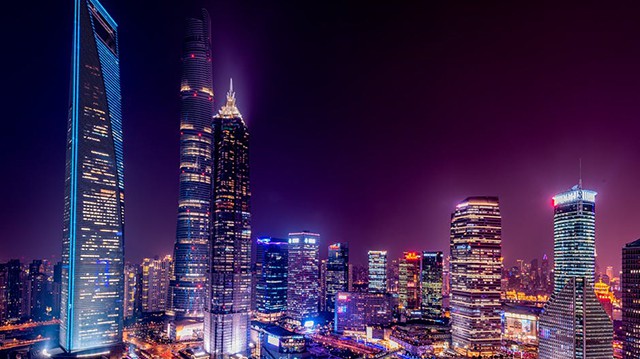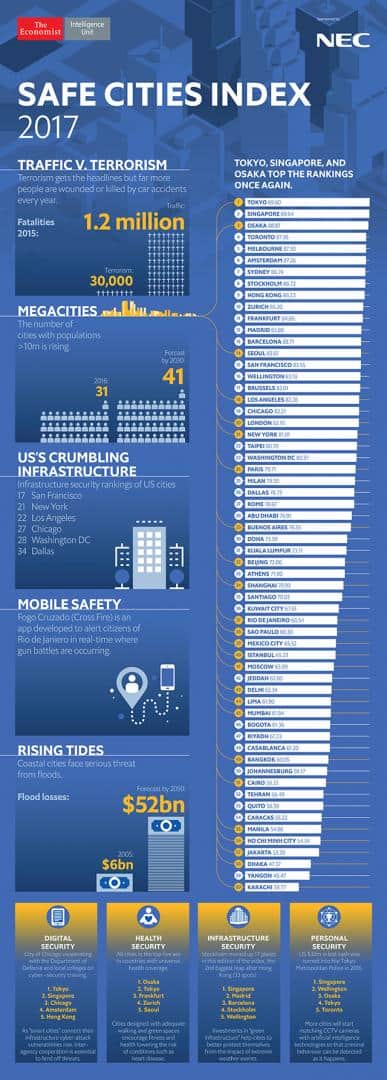Can You Guess the World’s Safest City?
Published October 12, 2017 at 8:47 pm

Whenever a high-profile crime occurs, people wonder if their once-beloved city is as safe as they felt it was five, 10 or even 20 years ago.
But although crime is always unsettling, it appears that our neck of the woods is remarkably safe and, therefore, an excellent place to live, work and play.
The Economist Intelligence Unit recently released its Safe Cities Index 2017: Security in a Rapidly Urbanising World and it revealed that Mississauga’s neighbour–and Canada’s most bustling municipality–ranks high on the list of safe cities. That’s right, Toronto is number four on a list of 60 cities, beaten out only by Tokyo (#1), Singapore (#2) and Osaka (#3).
Other cities in the top 10 include Melbourne, Amsterdam, Sydney, Stockholm, Hong Kong and Zurich.
Although the list doesn’t rank any suburbs or satellite cities, Mississauga’s proximity to one of the safest cities in the world should comfort those with security doubts.
As for the least safe cities, Africa, Asia and the Middle East dominate the bottom of the list. The top five least safe cities include Ho Chi Minh City, Vietnam (#5), Jakarta, Indonesia (#4), Dhaka, Bangladesh (#3), Yangon, Myanmar (#2) and Karachi, Pakistan (#60). Other countries in the bottom 10 include Manila, The Philippines, Caracas, Venezuela, Quito, Ecuador, Tehran, Iran, Cairo, Egypt and Johannesburg, South Africa.

According to the Economist, the report is based on the second iteration of the index, which ranks 60 cities across 49 indicators covering digital security, health security, infrastructure security and personal security.
“In many respects it’s the very success of cities, in their role as global social and economic hubs, that makes them more vulnerable,” the report reads. “As rural residents head for the city in developing countries and wealthy global capitals draw in international talent, vast demographic shifts are creating cities with previously unimagined population sizes. In 2016, there were 31 megacities. This is projected to rise to 41 by 2030.1.”
The report points out that, as cities grow–and the 905 has grown exponentially–security challenges intensify. Some issues that big cities face (and it’s no different in Mississauga) include housing issues (high home prices, low vacancies in the already expensive rental market, etc.) and the subsequent proliferation of slums and challenges associated with healthcare, transport and water and power infrastructure.
The report also notes that manmade risks are on the rise, as demonstrated by recent terrorist attacks in London, Paris and Barcelona.
That said, the report points out that technology, such as the spread of closed-circuit televisions (CCTVs) and webcams around cities, can help prevent some security issues.
However, technology should be treated with care.
“Yet the rush to embrace smart city technologies also creates vulnerabilities if investments in digital technologies are not accompanied by commensurate investments in cyber security,” the report reads. “Wealthy cities are making investments, albeit to varying degrees, but security often comes lower on the list of spending priorities for cities with already stretched finances.
The consequences of neglecting cyber security could be dire. For example, if hackers were to shut down the power supply, an entire city would be left in chaos. This prospect is something city officials now need to plan against.”
But while terrorist attacks in such dense, developed cities as London, Paris and Las Vegas tend to dominate headlines, people should remember that city dwellers are far more likely to be injured or killed in a car crash than at the hands of a terrorist(s).
Another risk? Climate change, as natural disasters, such as the recent Hurricane Harvey, are hammering vibrant cities and leaving casualties in their wake.
In terms of personal security, Toronto is actually the fifth safest country on the list–so you should always feel safe when you’re at home and when you’re venturing out to the big city to the east.
insauga's Editorial Standards and Policies advertising





